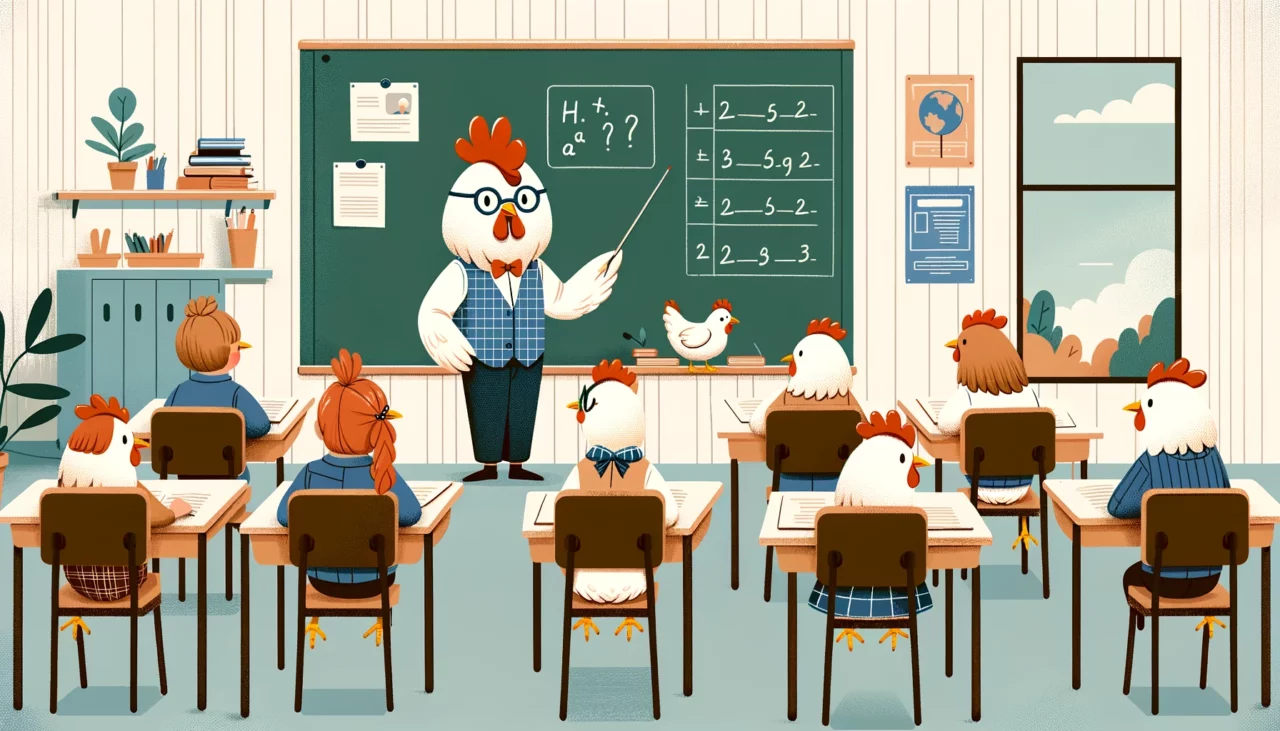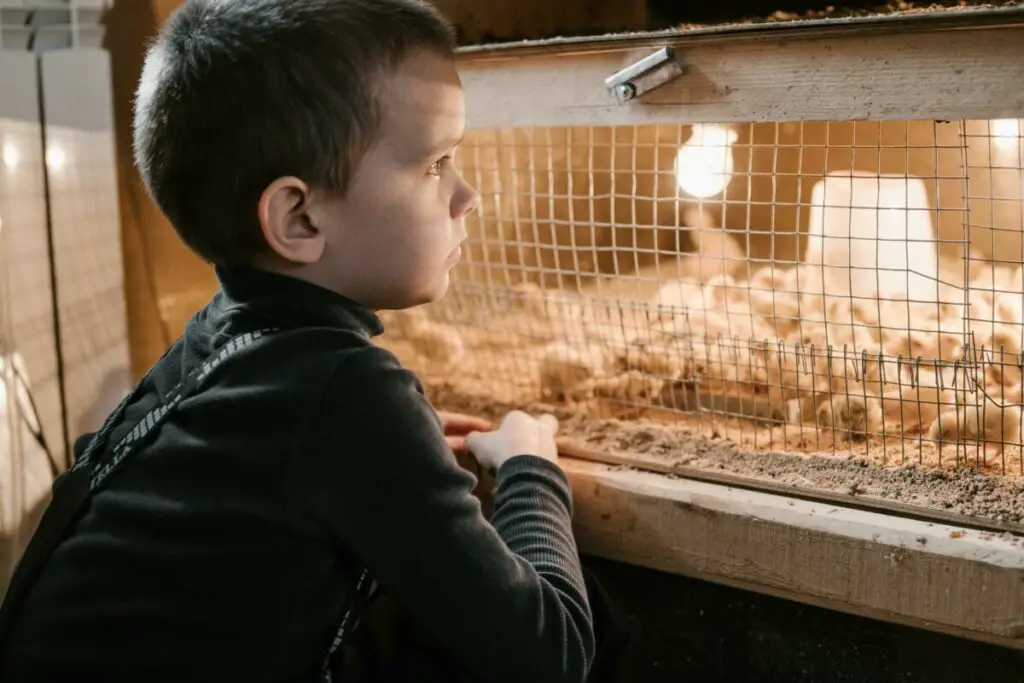This post contains affiliate links.
Discover the benefits of raising backyard chickens for children. Teach responsibility and life lessons while providing hands-on learning experiences. Learn how keeping chickens will enhance your children’s education, responsibility, and relationship with nature.
Raising backyard chickens offers a wealth of educational benefits for children, teaching them valuable life skills such as responsibility, empathy, and the basics of animal care. Through daily chores such as feeding, cleaning, and collecting eggs, children gain hands-on experience and a deeper understanding from where their food is generated.
Additionally, these activities encourage outdoor play, curiosity, and a sense of accomplishment. It is a unique and rewarding way to bond with your children while instilling important values and practical knowledge.
When my mom started our family journey of raising backyard chickens, we as children were extremely excited even though we did not understand what was in our future. She purchased pullets rather than hatching eggs, however, the experience of bonding with an animal was immediate. The activity engaged the whole family as we learned the dos and don’ts of raising backyard chickens.
My brother and I were very lucky kids. Not only did we have chickens, we had several animals including a cat, a dog, a backyard pond where our turtle and our frog lived, along with the fish and ghost shrimp we raised in that two-tiered small pond.
Mom is also an avid backyard gardener. As kids, she had five 4’ x 10’ raised bed garden boxes where we raised a little of everything. We also have enough property that we can have about 20 different fruit trees. We learned a lot about self-sustainability, along with plant and animal care, which carried over to our own homes as we left the nest.
Educational Benefits of Raising Backyard Chickens for Children
Raising backyard chickens offers numerous educational benefits that greatly impact children. One of the foremost advantages is teaching responsibility while fostering independence in children. By caring for backyard chickens, children learn the importance of daily chores and understand that living beings depend on them.
This daily routine helps children develop a strong sense of responsibility, making them more responsible individuals as they grow. When children are involved in the process of raising chickens, they engage in hands-on learning that traditional study methods do not provide. They observe the life cycles of chickens, understand their needs, and watch eggs turn into chicks, which is a fascinating and educational experience. Such experiences spark a child’s interest in biology and environmental studies, adding to their overall learning.
Backyard chickens also serve as a living lesson in sustainability. Children learn where food comes from as they gather eggs, understand the effort it takes to produce food, and appreciate the nutritional value of freshly-laid eggs. This awareness fosters a healthier attitude toward food and motivates children to make responsible dietary choices.
Moreover, children learn the value of empathy and compassion through regular interaction with chickens. Caring for animals encourages children to be gentle and respectful of other living beings, valuable traits that also extend into their interaction with people. By being responsible for these feathered friends, children inherently learn responsibility and the joy that comes from taking care of others.
Raising backyard chickens involves multiple disciplines. For example, children learn math through measuring feed, science through observing chicken behaviors, and even literacy as they read about chicken care. Such multidisciplinary learning broadens their knowledge base and makes education more engaging and enjoyable.
Additionally, raising chickens is a family activity, providing fun and bonding time. Parents and children work together to ensure that the chickens are well cared for, creating meaningful memories and strengthening family ties.
The benefits of keeping chickens go beyond mere enjoyment. It imparts lifelong learning habits, teaches children independence, and instills a strong sense of responsibility, making the experience both educational and profoundly rewarding.

Educational Benefits Children Receive
From Raising Backyard Chickens
- Responsibility:
Children learn to take care of the chickens by feeding them, providing clean water, and maintaining their coop. - Biology:
Kids get firsthand experience with the life cycle of chickens, from egg to chick to adult. - Nutritional Awareness:
Children gain an understanding of where their food comes from and the importance of healthy eating. - Patience:
Raising chickens teaches patience as they observe the gradual growth and development of the birds. - Environmental Stewardship:
Kids learn the importance of sustainability and the role chickens play in pest control and soil fertilization. - Empathy:
Caring for another living creature helps develop children’s empathy and compassion. - Problem-Solving Skills:
Children learn to troubleshoot common issues like predator attacks or chicken illnesses. - Teamwork:
Caring for chickens can be a family activity, teaching children to work together towards a common goal. - Time Management:
Kids learn to allocate time for daily chicken care alongside other responsibilities. - Science and Math:
Keeping track of egg production, feed quantities, and growth rates enhances their science and math skills. - Connection to Nature:
Raising chickens helps children develop a deeper connection to the natural world. - Work Ethic:
Daily chores associated with chicken care instill a strong work ethic in children. - Self-Sufficiency:
Learning to raise and care for chickens provides a sense of accomplishment and self-reliance. - Healthy Lifestyle:
Engagement in outdoor activities encourages a more active and healthy lifestyle for kids. - Interpersonal Skills:
Children can enhance communication and leadership skills through coordinating chicken care tasks.
Read my other related articles:
- Backyard Chickens and Children: A Guide to Raising Chickens as a Family Project
- Safe Interaction Between Children and Chickens
- Fun and Educational Chicken-Related Activities for Families
- Choosing the Right Chicken Breeds for Families with Children
- Building a Kid-Friendly Chicken Coop
- Lessons in Sustainability and Nature for Kids Through Chicken Keeping
- Sharing the Backyard Chicken Keeping Journey
Teaching Responsibility Through Daily Chicken Chores
Raising backyard chickens is not only a fun activity but also an educational one. This rewarding pastime is especially beneficial in teaching responsibility to children. When children are involved in the day-to-day care of chickens, they learn what it means to be responsible and how to take on significant roles within the family.
Daily chicken chores such as feeding the chickens, collecting eggs, and cleaning the coop offer numerous opportunities for children to develop a sense of duty and consistency.
First, feeding the chickens isn’t about just throwing food into a pen. Children need to recognize the importance of a balanced diet to ensure the health of their chickens. By measuring the correct amount of feed and providing fresh water daily, children learn the critical skill of responsible care. This act of feeding teaches them the importance of regularity and punctuality, which are essential components of care in any aspect of life.
Next, the chore of collecting eggs helps children understand the concepts of diligence and attention to detail. They will quickly realize that missing an egg collection results in dirty or even broken eggs, which affects the whole family. Collected eggs are counted and checked for quality, teaching children how to be observant and meticulous in their tasks.
This experience underscores the significance of their role and helps them grasp how their efforts directly contribute to the household. Cleaning the coop may not be the most exciting task, but it is an excellent way for children to learn responsibility. A clean coop is essential for the health and well-being of the chickens, and this job teaches children about the consequences of negligence.
By regularly removing old bedding and ensuring the coop is dry and sanitary, children learn the value of maintaining a clean environment.
Additionally, raising chicks is an even more vivid way of teaching children about life cycles and development. Caring for chicks from their early days requires special attention and care, giving children real, hands-on experience in nurturing life. This aspect of raising chickens fosters a sense of empathy and an understanding of the growth process.
The daily chore of caring for backyard chickens instills a strong sense of responsibility in children. These activities not only contribute to their learning but also prepare them for various aspects of life by fostering a sense of responsibility, punctuality, and empathy.

Empathy and Respect: How Raising Chicks Teaches Children the Importance of Being Gentle
Raising backyard chickens offers numerous benefits, especially when teaching children empathy and respect. By taking care of chicks, children quickly learn the importance of being gentle. When families introduce young children to baby chicks, the interaction teaches children how to deal with birds in a way that fosters empathy.
As they feed and nurture these young animals, children understand the fragility of life and the responsibility we have toward these tiny creatures. Empathy is a fundamental trait that helps children connect with others. By raising their chicks, children learn empathy and compassion.
Watching a young chick grow and develop gives children firsthand experience in patience and nurturing, reinforcing the importance of being gentle.
It is essential for children to realize that even the smallest action will affect the well-being of another living being. Respect goes hand-in-hand with empathy. When children spend time with their baby chicks, they develop a deep respect for the lives of these animals. Daily tasks such as feeding, cleaning the coop, and ensuring that the chicks are comfortable, play a significant role in this learning process. Such experiences are invaluable as a means to teach children how to respect other living beings and appreciate life in various forms.

Allowing children to be part of the outdoor environment where they raise chicks further enhances this learning. The natural setting provides a perfect backdrop for children to see how their actions impact the birds and the entire ecosystem. It is an immersive experience that strengthens their respect for nature and animals.
Moreover, raising chickens is a wonderful activity that involves the whole family. When children, along with parents, take care of their chicks, it becomes a family bonding time that is both educational and enjoyable. Children learn that their actions matter not just to the chicks but to the overall happiness of the family unit.
Children raising backyard chickens significantly contributes to their emotional and social development. By taking on the responsibility of caring for young chicks, children learn empathy and compassion, the importance of being gentle, and the significant roles empathy and respect play in their lives. Such lessons extend beyond their interactions with animals and birds, impacting how they treat people and the world around them.
Understanding Where Food Comes From: The Role of Eggs in a Child’s Learning
Teaching children the value of understanding where their food comes from is an essential part of their education. By raising backyard chickens, children will witness firsthand the role of eggs in their daily lives. A child’s learning greatly benefits from seeing how eggs are laid by hens and collected each morning.
This hands-on approach to food production provides children with a tangible connection to the origins of their food. When children are involved in raising chickens, they discover how much effort goes into keeping the flock healthy and the eggs abundant. This not only teaches them responsibility but also gives them a new appreciation for the delicious eggs they enjoy at breakfast.
In small backyard farms, children will observe the entire lifecycle of chickens, from chicks to mature hens and understand how a properly managed flock contributes to a steady supply of eggs. This real-world learning context makes it easier for children to grasp complex agricultural concepts, sparking a lifelong interest in sustainable living and self-sufficiency.
Backyard chickens as pets also offer a unique opportunity for children to learn about the different breeds of hens and their egg-laying habits. This type of active engagement turns an ordinary backyard into a productive and educational space. Whether the chickens roam a small garden or a larger enclosure, children become stewards of their environment, fostering a love for nature and animals.
Raising chickens helps children identify with farming practices, even if it is just on a small scale, and emphasizes the importance of ethics in food production. By participating in the daily chores of feeding, cleaning, and egg collection, children gain a concrete understanding of where their food comes from and the various processes involved in bringing it to the table. It is a fulfilling way to instill a sense of accomplishment and pride in their work.

By understanding the role of eggs in both nutrition and education, children learn that healthy food does not just magically appear—it is the result of careful planning and labor. These life lessons will stay with them, shaping their attitudes towards food, responsibility, and environmental stewardship for years to come.
The Fun and Bonding Time of Keeping Chickens
Keeping chickens is not just an educational experience. It is also a fun and bonding time for the whole family. When you bring baby chicks into your backyard, you create an opportunity for endless joy and entertainment.
Watching these baby chickens grow, from their time in the brooder to the moment they move into the coop, is something children enjoy immensely. The family can gather around and witness these tiny chicks turn into full-grown, friendly chickens, fostering a sense of togetherness and shared experiences.
There is something about the daily routine of caring for chickens that brings a family closer. Children will love the task of feeding the chickens, collecting eggs, and cleaning the coop. These activities do not just teach responsibility; they also create wonderful memories. Outdoor time with your children is great time spent in the company of your feathered friends. It is a healthy way for children to spend time outside, soaking up sunlight, and enjoying the great outdoors away from screens.
A backyard filled with the sounds of clucking chickens will turn any family gathering into something special. Children often get very attached to their chickens, naming them, and considering them part of the family. This emotional bond is a significant benefit of raising chickens. Children learn empathy and kindness as they handle these gentle creatures with care.
But the fun doesn’t stop there! Creativity sparks when children engage in activities such as designing the perfect coop or even drawing pictures of their favorite chickens. Family projects might include building a new brooder or creating cozy nesting areas in the coop. These shared tasks promote teamwork and communication, vital skills for children to learn.
Overall, the experience of keeping chickens in your backyard is more than just educational—it is a delightful way to bond as a family. When you integrate these animals into your daily life, you are raising chickens while nurturing a loving and dynamic family environment. Children gain so much more than knowledge. They gain experience, love, and a sense of accomplishment that they will carry into other areas of their lives.
Check out my other posts on Backyard Chickens
Frequently Asked Questions about Raising Backyard Chickens
Q: What are the educational benefits of children raising backyard chickens?
A: Raising backyard chickens offers numerous educational benefits for children. It teaches them valuable life skills of responsibility, empathy, and the basics of animal care. Through daily chores of feeding, cleaning, and collecting eggs, children gain hands-on experience and develop a deeper understanding of where their food comes from. These activities also encourage outdoor play, curiosity, and a sense of accomplishment.
Q: How does caring for chickens teach children responsibility?
A: Caring for chickens teaches children responsibility by involving them in daily chores that ensure the well-being of the birds. Tasks of feeding the chickens, collecting eggs, and cleaning the coop require consistency and punctuality. Children learn the importance of regular care, the consequences of neglect, and the satisfaction of seeing their efforts produce tangible results.
Q: In what ways will raising chickens foster empathy and compassion in children?
A: Raising chickens fosters empathy and compassion by requiring children to be gentle and considerate towards the animals. Interaction with chickens helps children understand the fragility of life and the importance of nurturing living beings. Regular care tasks, such as ensuring the chickens are comfortable and healthy, teach children to respect and appreciate other forms of life, reinforcing empathy that will extend to human relationships.
Q: How does raising backyard chickens contribute to a child’s understanding of sustainability and food sources?
A: Raising backyard chickens contributes to a child’s understanding of sustainability and food sources by providing a direct, hands-on experience of food production. Children witness the lifecycle of chickens and learn about the effort involved in producing eggs. This tangible connection to food origins fosters an appreciation for sustainable living, ethical farming practices, and self-sufficiency. They also gain a healthier attitude toward food by recognizing its nutritional value and the work required in its production.
Q: What family benefits can come from raising backyard chickens?
A: Raising backyard chickens offers several family benefits. It creates opportunities for bonding through shared activities of feeding the chickens, collecting eggs, and building or maintaining the coop. These tasks foster teamwork and communication among family members and strengthen ties. Additionally, the routine of caring for chickens will bring joy, entertainment, and a sense of togetherness. Children often form emotional bonds with the chickens, naming them and considering them part of the family, which enhances their empathy and kindness.
By engaging in this rewarding pastime, families not only enjoy the practical aspects of raising chickens but also create lasting memories and instill lifelong values in children.
In summary, the experience of keeping backyard chickens is multifaceted, providing children with practical skills, emotional growth, and a deeper understanding of the world, while also fostering family unity and enjoyment.
Paying It Forward
Backyard Visitors participates in affiliate programs which compensate us for referring traffic.

